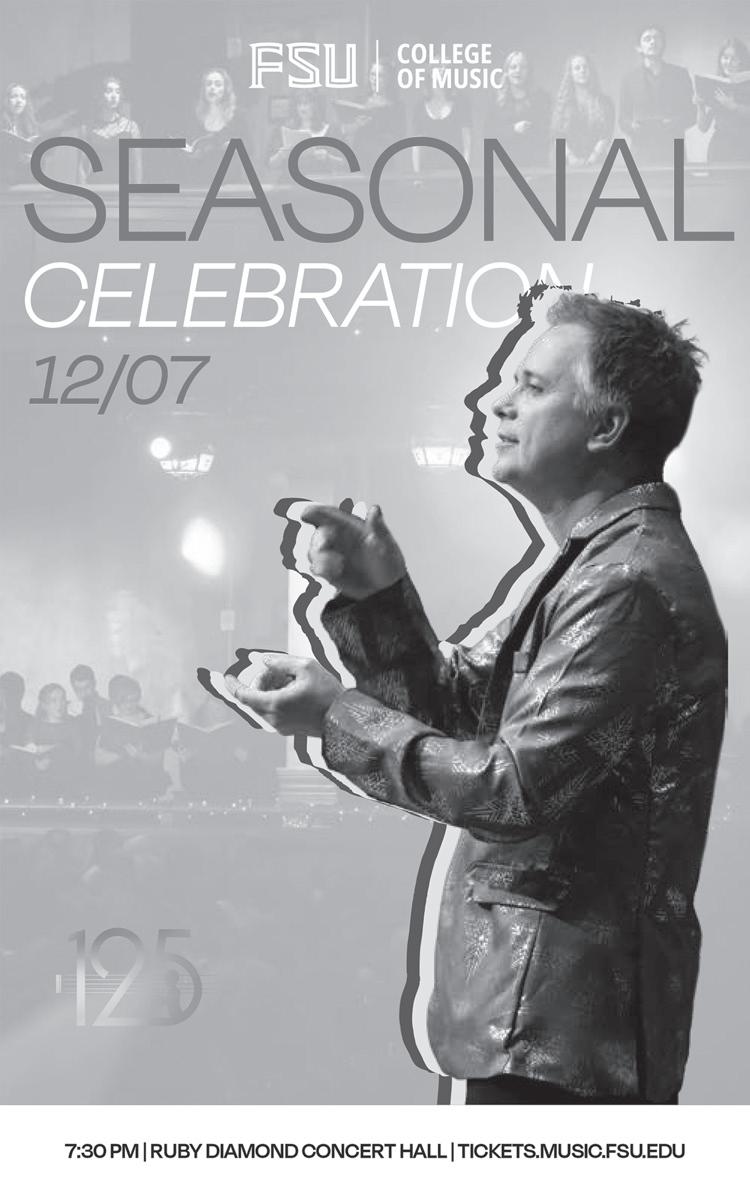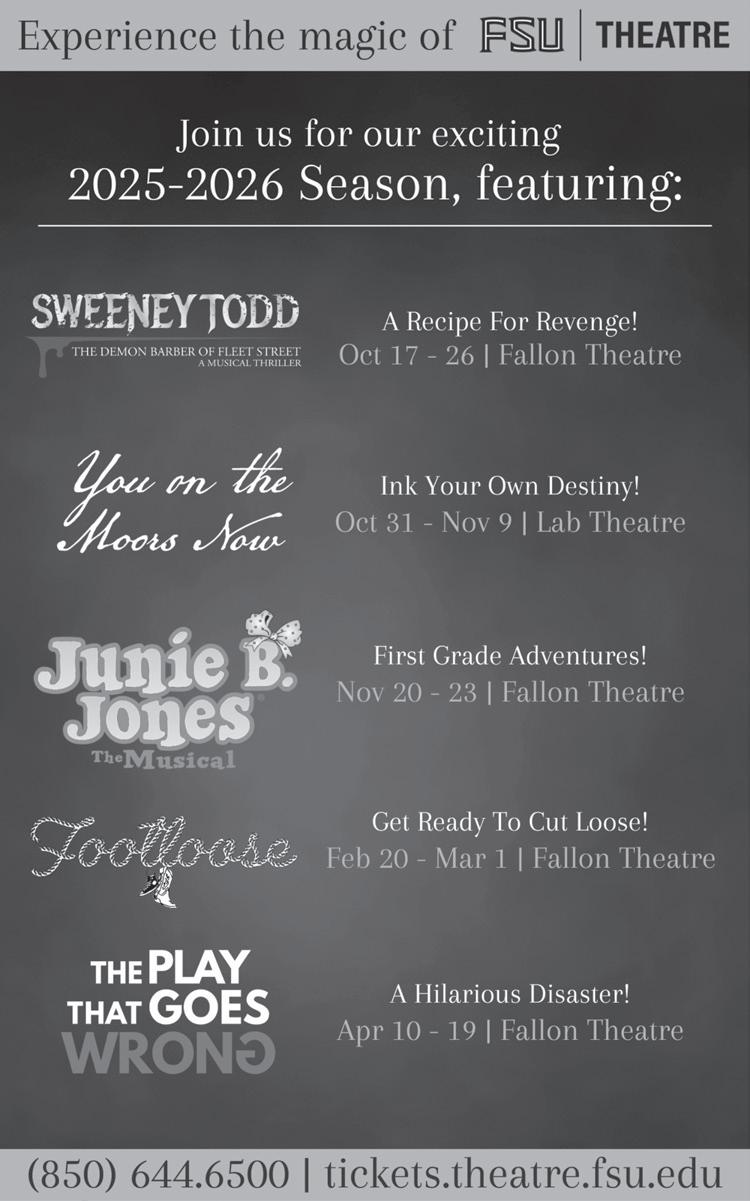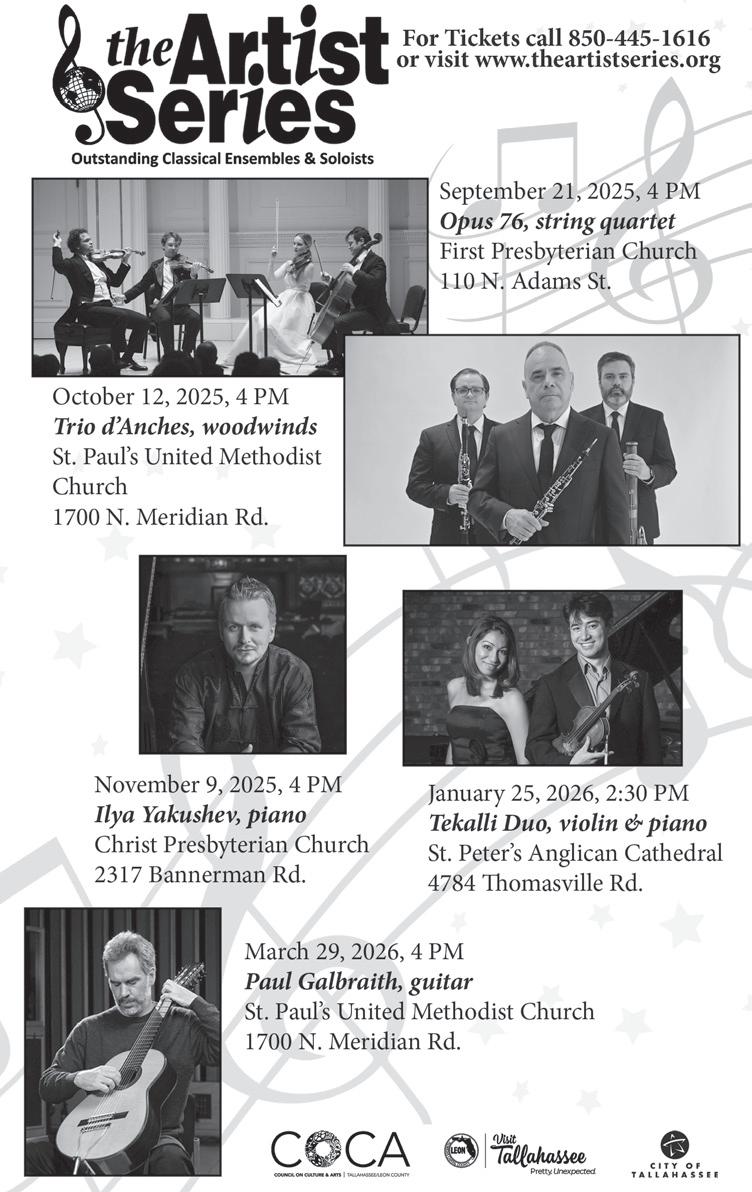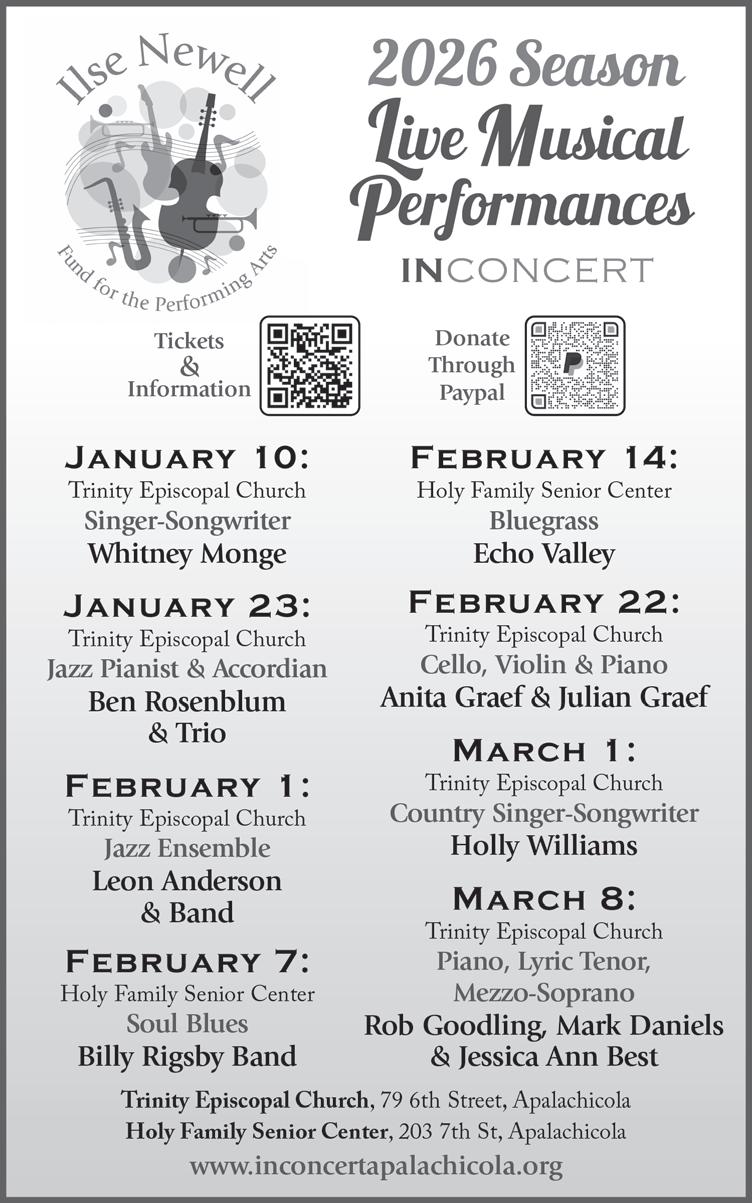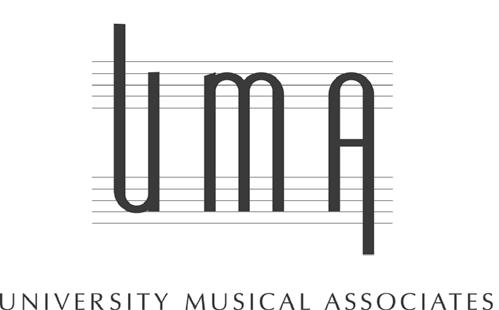THE FLORIDA STATE UNIVERSITY
COLLEGE OF MUSIC
Presents THE UNIVERSITY
WIND ENSEMBLE
Patrick Dunnigan, Director
Aaron Ovsiew, Graduate Associate Conductor
Nicholas Nadal, Graduate Associate Conductor
with faculty artist
Matthew Hightower, Tuba
Tuesday, November 18, 2025
Seven-thirty in the Evening
Ruby Diamond Concert Hall
PROGRAM
Overture to “Candide” (1956) Leonard Bernstein (1918–1990) arr. Clare Grundman
Aaron Ovsiew, graduate associate conductor
First Suite in E-Flat for Military Band (1909)
Gustav Holst
I. Chaconne (1874–1934)
II. Intermezzo
III. March
Ballad for Band (1946)
Nicholas Nadal, graduate associate conductor
Pineapple Poll (Suite from the Ballet) (1951)
Morton Gould (1913–1996)
Arthur Sullivan
I. Opening Number (1842–1900)
II. Jasper’s Dance arr. Charles Mackerras
III. Poll’s Dance
IV. Finale
The Meadowlands (2025)
INTERMISSION
Matt Hightower, tuba — World Premiere —
Matt Hightower (b. 1987)
Asphalt Cocktail (2009)
Niagara Falls (1997)
John Mackey (b. 1973)
Michael Daugherty (b. 1954)
Please refrain from talking, entering, or exiting while performers are playing. Food and drink are prohibited in all concert halls. Please turn off cell phones and all other electronic devices. Please refrain from putting feet on seats and seat backs. Children who become disruptive should be taken out of the performance hall so they do not disturb the musicians and other audience members.
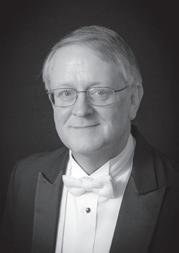
Patrick Dunnigan is Director of Bands and Professor of Music at the Florida State University College of Music in Tallahassee. A member of the FSU faculty since 1991, Dunnigan is the principal conductor and music director of the University Wind Ensemble. His other teaching duties include undergraduate conducting courses and instrumental music methods. As Director of Bands, he oversees all aspects of the FSU band program which includes five concert bands, a chamber music program, graduate teaching program, and athletic pep bands.
A nationally recognized guest conductor, adjudicator, and clinician, Dunnigan has published numerous articles on conducting, instrumental music methodology, and research in leading journals including The Instrumentalist, Music Educators Journal, Bulletin for the Council for Research in Music Education, and the Journal of Band Research. His textbook, Marching Band Techniques, is published by The Instrumentalist Company and has become a leading college textbook of marching band methodology. His transcriptions and arrangements for concert band are performed regularly by major university, community, and professional wind bands including the Dallas Wind Symphony. He has presented clinic sessions for the Midwest Clinic, the Music Educators National Conference, the Florida Bandmasters Association, the College Band Directors National Association, the World Association of Symphonic Bands and Ensembles, and many others.
Dunnigan received the Doctor of Philosophy in Music Education degree from the University of Texas at Austin, the Master of Music in Conducting degree from Northwestern University, and the Bachelor of Music Education degree from the University of Kentucky. He is an active member of the College Band Directors National Association, Music Educators National Conference, Florida Music Educators Association, National Band Association, Florida Bandmasters Association, and Phi Mu Alpha Sinfonia Music Fraternity. He is also an honorary member of the Michigan School Band and Orchestra Association, Kappa Kappa Psi, and Tau Beta Sigma, and received the Friend of the Arts award from Sigma Alpha Iota.
Dunnigan received the prestigious FSU Teaching Award in both 2003 and 2012. In 2006, he was elected to membership in the prestigious American Bandmasters Association. He served as National President of the College Band Directors National Association from 2015 to 2017.
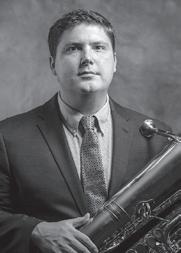
An award-winning teacher, performer, and composer, Matthew Hightower is Assistant Professor of Tuba and Euphonium at the Florida State University College of Music and principal tuba with the Tallahassee Symphony. Prior to his appointment at Florida State, Hightower held similar positions at the University of Kentucky and Texas A&M University-Kingsville.
An avid chamber musician, Hightower was tubist with the Corpus Christi, Kingsville, and University of Kentucky Brass Quintets. He has also performed with the Lexington Philharmonic Brass Quintet, the Mirari Brass Quintet, the Atlas Tuba Quartet, Backburner Tuba-Euphonium Ensemble, and Concert:Nova
Some of his credits as a large ensemble performer include appearances with the Bloomington Camerata Orchestra, The Columbus (IN) Symphony, The Evansville Philharmonic, The Iceland Symphony Orchestra, The Louisville Ballet, The Jackson Symphony, the Lexington Philharmonic, the Victoria Symphony Orchestra, the Victoria Bach Festival, the WCIT World Orchestra in Yerevan, Armenia, and David Baker’s 20th Century Bebop Band.
Hightower, a product of entrepreneurship, firmly believes in the importance of 21stcentury musicians who acquire and maintain a diverse set of skills. As such, Hightower’s career embodies every aspect of the music process from composing and arranging to recording and performing. Hightower’s debut album, Re(in)spiration, released in 2019, was a finalist for the 2021 ITEA Roger Bobo Award for Excellence in Recording. According to the International Tuba Euphonium Association Journal, “Re(in)spiration illustrates Hightower’s outstanding skills as a performer and artist” and “showcases [his] total control of the horn, concrete fundamentals, and musical sincerity.” He can also be heard on the University of Texas Wind Ensemble’s Wine Dark Sea, Society of Composers, Inc.’s Flare: Vol 32, the University of Kentucky Faculty Brass Quintet’s New Music for Brass Quintet, and the University of Kentucky Tuba-Euphonium Ensemble’s Blue Thunder, amongst others.
Hightower himself has been the recipient of several awards, including the 2010 KMEA Intercollegiate Composition Contest, the 2021 ITEA Winston Morris Award for Tuba Ensemble Composition, and the 2023 ITEA Harvey Philips Award for Excellence in Composition for tuba in a solo role. Many of his arrangements and original works are published through Potenza Music and Absolute Brass Publishing. He is also a composer for Fannin Musical Productions, where he arranges and composes music for high school marching bands across the United States.
Hightower is also a dedicated educator whose students have won prizes at the Leonard Falcone Competition, Macauley Chamber Music Competition, and various regional and International Tuba-Euphonium Conferences including the inaugural ITEA Collegiate Ensembles Competitive Showcase Competition in 2023.
As an active member of the International Tuba Euphonium Association, Hightower has performed and adjudicated at several regional and international ITEA events and hosted the 2022 Midwest Regional Conference at the University of Kentucky.
Hightower earned the BM in music education from Murray State University, the MM in tuba performance from Indiana University, and the DMA from the University of Texas at Austin. His primary instructors were Ray Conklin, Daniel Perantoni, and Charles Villarrubia, with additional instruction in the field of composition from Mike D’Ambrosio, John Fannin, and P.Q. Phan.
Matt Hightower is a B&S performing artist.
NOTES ON THE PROGRAM
Bernstein: Overture to “Candide”
Leonard Bernstein (1918–1990) was one of the most influential American composers, conductors, and music educators of the 20th century. Born in Lawrence, Massachusetts, he showed a natural musical ability early in life and began taking piano lessons and composing as a teenager. Bernstein earned his BA in Music from Harvard before completing a degree in conducting with Fritz Reiner at the Curtis Institute of Music in Philadelphia. At the age of 25, Bernstein earned worldwide praise and fame when he, the newly hired Assistant Conductor of the New York Philharmonic, stepped in for guest conductor Bruno Walter with only a few hours’ notice. After this performance, Bernstein showcased his ability as a conductor and composer across the US and abroad. He served as Music Director of the New York Philharmonic from 1958 to 1969, where he brought their Young People’s Concerts to television for the first time – educating millions of children on the joys and complexities of classical music. As a conductor, he appeared with some of the world’s finest orchestras, including the Vienna Philharmonic, London Symphony Orchestra, Chicago Symphony Orchestra, and Berlin Philharmonic. In addition to his fame as a conductor, Bernstein built a strong reputation as a composer of both classical and Broadway music. Some of his famous compositions include Mass: A Theatre Piece for Singers, Players, and Dancers; Candide; West Side Story; and his three symphonies (Jeremiah, Age of Anxiety, and Kaddish).
Clare Grundman (1913-1996) has written over 100 compositions for band, film, radio, and television. He earned a BS in education in 1934 from The Ohio State University before teaching music in Ohio and Kentucky. He returned to OSU for his master’s degree, during which time he also taught woodwind methods and served as assistant director of the concert and marching bands. He later studied composition with Paul Hindemith
at the Berkshire Music Center. Throughout his life, Grundman received several awards, including the American Bandmasters Association’s Edwin Franko Goldman Memorial Citation in 1983, the Sudler Order of Merit of the John Philip Sousa Foundation in 1990, and the American School Band Directors Association’s Goldman Award in 1992. While Grundman has made significant contributions to the wind ensemble medium as a composer, he has also produced arrangements of the works of Copeland, Holst, and, of course, Bernstein that have become standard band repertoire.
Candide was Leonard Bernstein’s third Broadway musical. The musical opens in the mythical European kingdom of Westphalia and we are introduced to the Baron Thunderten-Tronckh and his family – including his nephew Candide. As the story continues, the Bulgarians invade Westphalia and kidnap Candide. He then escapes and looks for a greater life in Lisbon, Paris, Buenos Aires, El Dorado, only to see the poverty, crime, and suffering in each city, finally arriving in Venice, disillusioned and stripped of his former optimism. The overture emulates the youthful energy and naïveté of Candide and features the two main themes from the show: a lush and flowing love theme sung by Candide, and the up-tempo aria sung by his cousin, Cunegonde.
Holst: First Suite in E-Flat for Military Band
British composer Gustav Holst (1874 – 1934) came from a long line of musicians and performers. His father, Adolphus, was a well-known pianist who served as the organist and choirmaster at All Saints’ Church in Cheltenham, England. His great-grandfather, Matthias, was a composer and harpist in the Russian Court in the late 18th and early 19th centuries. However, it was Holst’s own musical journey that led him to become a great composer. He began by playing the violin before switching to the piano. In 1893, he earned his first professional position, first playing organ in a local village and then with the choral society of Bourton-on-the-Water. It was in these positions that Holst learned the strong history of the English choral tradition. Later, after hearing the music of Arthur Sullivan (which will be performed by the FSU Wind Ensemble tonight), Holst composed his own operetta, Lansdown Castle, which impressed his father enough to send money to assist with his application to the Royal College of Music.
As a child, Holst battled nerve inflammation, which made it painful to play piano for long periods of time, so he began playing trombone as well. Not only did this provide him the opportunity to play in orchestras, where he learned more about scoring for wind instruments, it also helped him earn the income necessary to pay for his education. At the Royal College of Music, Holst studied piano, organ, trombone, and orchestration. After working as a trombonist and composer for a few years, he was appointed Director of Music at St. Paul’s Girls’ School in Hammersmith, London, in 1905 – a position he held until his death. It was his daily commute through the Hammersmith neighborhood that inspired his piece of the same name.
groups, and full band, published through Potenza Music and Absolute Brass Publishing. His music has been recognized with multiple awards from the International Tuba Euphonium Association, including the Winston Morris and Harvey Phillips Awards for Composition. A dynamic advocate for his instrument, Hightower’s artistry reflects the versatility and expressive range of the modern tuba.
The Meadowlands, composed in 2024, is a concerto for tuba and wind ensemble that traces the rich musical lineage of Hightower’s home state of Kentucky. The work represents both a personal and musical homecoming, marking his first full-scale composition for wind ensemble. The title itself comes from the Iroquoian origin of the word “Kentucky,” meaning “meadowland,” and the music follows a programmatic journey through the region’s diverse cultural history. It begins by evoking the sounds of the Cherokee people traveling through western Kentucky along the Trail of Tears, then transitions through the emergence of bluegrass before blossoming into a vibrant “newgrass” style inspired by modern icons such as Sam Bush, Ricky Skaggs, and Chris Thile. Lyrical, reflective, and deeply rooted in place, The Meadowlands celebrates the musical spirit of Kentucky while serving as a personal reflection on home, transition, and renewal. Tonight’s world premiere performance features the composer, Matthew Hightower, as the soloist.
Mackey: Asphalt Cocktail
John Mackey (b. 1973) is one of today’s most frequently performed American wind band composers, celebrated for his electrifying orchestration, rhythmic intensity, and emotional immediacy. A graduate of the Cleveland Institute of Music (studying with Donald Erb) and The Juilliard School (with John Corigliano), Mackey first gained attention for his collaborations with major dance companies, including Parsons Dance and Alvin Ailey. His music has since been performed worldwide, earning him the ABA/Ostwald Award and the William D. Revelli Composition Contest. Known for works such as Redline Tango, Aurora Awakes, and Wine-Dark Sea, Mackey continues to redefine the expressive possibilities of the modern wind ensemble.
Asphalt Cocktail (2009) was commissioned by Howard J. Gourwitz as a gift to Dr. Kevin Sedatole and the Michigan State University Wind Symphony, which premiered the work at the CBDNA National Convention in Austin, Texas. Written as a high-octane concert opener, the piece is a sonic snapshot of New York City’s grit, chaos, and swagger. Mackey described it as “Napoleonic Testosterone Music,” full of biting brass, sharp rhythmic crosscurrents, and relentless backbeats, “the scariest NYC taxi ride you can imagine.” The title, borrowed from his friend and fellow composer Jonathan Newman, inspired Mackey to create a five-minute burst of kinetic energy that fuses the pulse of jazz, the drive of rock, and the precision of classical technique. True to its name, Asphalt Cocktail is best served loud and on the rocks.
Daugherty: Niagara Falls
Composer Michael Daugherty (b. 1954) is a multiple-time Grammy Award winner. His orchestral music has earned six Grammys, including the 2011 award for Best Classical Compendium for Duex ex Machina. Daugherty studied composition with Pierre Boulez at the Institute for Research and Coordination in Acoustics/Music in Paris, Betsy Jolas at the Paris Conservatory, Jacob Druckman and Roger Reynolds at Yale, and György Ligeti in Hamburg. However, much of his music is inspired by the experiences of his youth, both in his home state of Iowa and his family’s travels. As a child, he began learning rock and jazz drum set, eventually becoming the leader and arranger of a rock, soul, and funk band in high school. Daugherty also studied piano, accompanying his high school’s concert choir and playing jazz piano across the country. Much of Daughtery’s music aims to capture the essence of the imagery he witnessed on the summer trips with took with his family to iconic American locations such as Mount Rushmore, Miami Beach, and Niagara Falls. Daughterty has served as Professor of Composition at the University of Michigan since 1991, where he mentors and encourages the next generation of composers to write for band.
Niagara Falls (1997) was commissioned for H. Robert Reynolds and the University of Michigan Symphony Band. The first performance took place in Hill Auditorium in Ann Arbor as part of the university’s “Band-O-Rama.” The piece is meant to pay homage to all aspects of Niagara Falls, including Daugherty’s family trips as a child. Not only are the falls naturally beautiful, but they also generate electricity for the surrounding communities and have become a hub for tourists and souvenirs. Daugherty sees Niagara Falls as another souvenir – a “ten-minute musical ride over the Niagara River with an occasional stop at a haunted house or wax museum along the way.” The piece opens with a chromatic theme in low woodwinds that follows the syllabic structure of “Niagara Falls.” The steady rhythm in the low brass and timpani, which accompanies the second theme played by the French horns, is meant to evoke the consistent current and energy generated by the falls. The alto saxophone and vibraphone are the first to state the most pervasive theme of the piece, a blues-inspired “riff” that is passed around to nearly every member of the ensemble before it appears at three different rhythmic levels towards the close of the piece.
University Wind Ensemble Personnel
Patrick Dunnigan, Director
Aaron Ovsiew and Nicholas Nadal, Graduate Associate Conductors
Piccolo
Sarah Kimbro
Flute
Moriah Emrich*
Matthieu North
Sophie Palm
Kayla Crider
Oboe
Loanne Masson**
Lorin Zamer**
Peter Arbogast
Lee Howell
English Horn
Loanne Masson
Bassoon
Hunter Fisher*
Alex Rameau
Jake Naroña
Genesis Olmeda-Perez
E-Flat Clarinet
Elizabeth Kennedy
Reymon Contrera
B-Flat Clarinet
Eric Olmsted**
Ava Raposo**
Daniel Burrow
Elizabeth Kennedy
Abby Varnadoe
Joseph Eckhart
Rachael Malawey
Isabelle Parsons
Halle Mynard
Bass Clarinet
Caron Braggs
Dawson Huynh
Contrabass Clarinet
Dawson Huynh
Saxophone
Raymond Wilkerson*
Casey Caulkins
Jennifer Fuentes
Kaiden Klingler
Olivia Turke,
Trumpet/Cornet
Jordyn Myers**
Nathan Reid**
Grason Peterson
Tyler Bennett
Max McLaughlin
Katherine Brinkman
Horn
Isaac Roman*
Davis Craddock
David Pinero
Wesley Vaden
Emma Brockman
Trombone
Mateo Buitrago*
Sam Mercier
Allen Wroten
Jacob Zussy, Bass
Euphonium
Adam Zierden*
Kris Stottlemire
Tuba
Connor Kelley*
Braden Meyer
Teddy Marvel
String Bass
Gavin Smith
Piano
Thong Truong
Harp
Amber Harris
Percussion
Caitlin Magennis*
JJ Baker
Waylon Hansel
Drew Jungslager
Owen Montgomery
Jessica Weinberg
Ethan Turner
Gabby Overholt
*Principal
**Co-Principal






